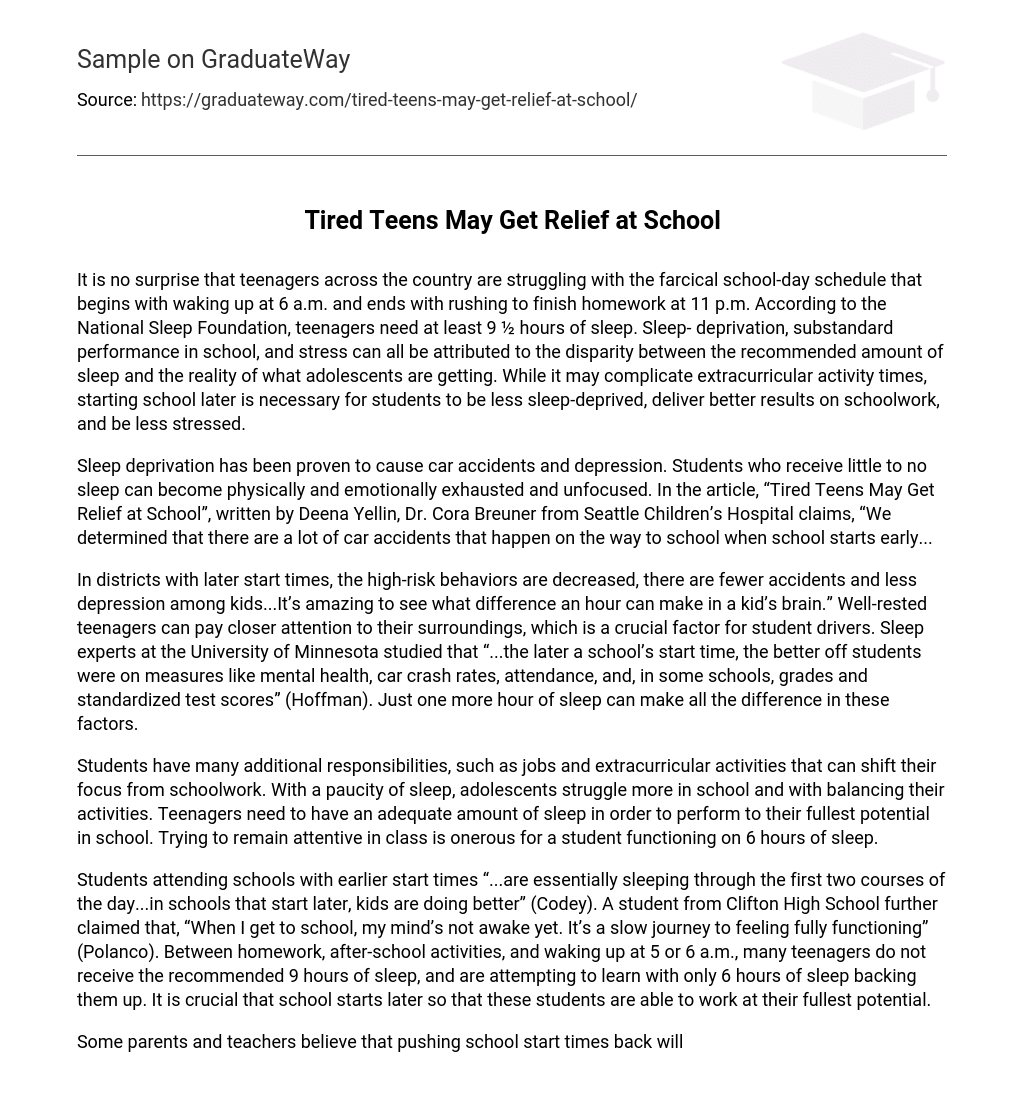It is no surprise that teenagers across the country are struggling with the farcical school-day schedule that begins with waking up at 6 a.m. and ends with rushing to finish homework at 11 p.m. According to the National Sleep Foundation, teenagers need at least 9 ½ hours of sleep. Sleep- deprivation, substandard performance in school, and stress can all be attributed to the disparity between the recommended amount of sleep and the reality of what adolescents are getting. While it may complicate extracurricular activity times, starting school later is necessary for students to be less sleep-deprived, deliver better results on schoolwork, and be less stressed.
Sleep deprivation has been proven to cause car accidents and depression. Students who receive little to no sleep can become physically and emotionally exhausted and unfocused. In the article, “Tired Teens May Get Relief at School”, written by Deena Yellin, Dr. Cora Breuner from Seattle Children’s Hospital claims, “We determined that there are a lot of car accidents that happen on the way to school when school starts early…
In districts with later start times, the high-risk behaviors are decreased, there are fewer accidents and less depression among kids…It’s amazing to see what difference an hour can make in a kid’s brain.” Well-rested teenagers can pay closer attention to their surroundings, which is a crucial factor for student drivers. Sleep experts at the University of Minnesota studied that “…the later a school’s start time, the better off students were on measures like mental health, car crash rates, attendance, and, in some schools, grades and standardized test scores” (Hoffman). Just one more hour of sleep can make all the difference in these factors.
Students have many additional responsibilities, such as jobs and extracurricular activities that can shift their focus from schoolwork. With a paucity of sleep, adolescents struggle more in school and with balancing their activities. Teenagers need to have an adequate amount of sleep in order to perform to their fullest potential in school. Trying to remain attentive in class is onerous for a student functioning on 6 hours of sleep.
Students attending schools with earlier start times “…are essentially sleeping through the first two courses of the day…in schools that start later, kids are doing better” (Codey). A student from Clifton High School further claimed that, “When I get to school, my mind’s not awake yet. It’s a slow journey to feeling fully functioning” (Polanco). Between homework, after-school activities, and waking up at 5 or 6 a.m., many teenagers do not receive the recommended 9 hours of sleep, and are attempting to learn with only 6 hours of sleep backing them up. It is crucial that school starts later so that these students are able to work at their fullest potential.
Some parents and teachers believe that pushing school start times back will not solve the stress of everyone involved because it will complicate after-school activities. School districts that are debating the change in schedule claim that, “Many won’t be able to hold after-school jobs and internships or join in other experiential learning opportunities when schools run later” (Blanford). Getting a sufficient amount of sleep for these growing adolescent’s bodies is most important overall, and many sports and jobs can work around students’ school schedules.
Schools that have tried the later-start schedule in Missouri came up with a solution of “…adding Wi-Fi access on buses so athletes can do homework on the road, and having some classes meet only once or twice a week, with supplemental online instruction. More sports and clubs meet before school” (Hoffman). With nine months of the new schedule, Rock Bridge High in Missouri reported successful results of students seeming more rested and alert. While the new school schedule could affect activities in the evening, there are many attainable solutions. Starting school later and at a reasonable time is paramount for teens’ health and wellbeing.
There is no question that students are struggling with the early-morning to late-night daily schedule caused by the absurd school times. Teenagers are chronically tired, unable to focus and perform well in school, exceptionally stressed, and highly risk getting into car accidents due to the fact that they do not get enough sleep.
By beginning school an hour or a few later, student depression rates will lower and they will execute better in class and extracurricular activities. This small change will positively affect school-children now, and in years to come. Giving teenagers the sleep they need in order to be successful is the solution to the many complications explained that are seen in society today and in the future.





